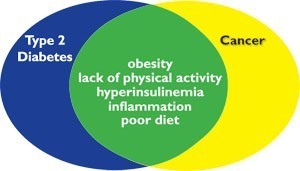Eat healthy, be physically active. We talk about these recommendations a lot for cancer prevention. Now a major new review of the evidence concludes that if you are one of the 86 million Americans at risk of developing type 2 diabetes, you can reduce your risk of this disease by participating in a program that combines both diet and physical activity. That means you’ll also have lower risk for many cancers.
Reports in the past few years have found that having type 2 diabetes increases the risk of several cancers, such as liver, pancreas, endometrium, colon/rectum, breast, and bladder. We talk about why that might be here with our expert.
Today’s recommendations were published in the Annals of Internal Medicine and they come from the Community Preventive Services Task Force, an independent group of experts. The task force found 53 studies that had programs encouraging people at risk of type 2 diabetes to improve their diet and increase their physical activity. All the programs used trained providers and lasted at least three months, with an average of about a year.
In total, there were 66 programs.
Compared with those undergoing standard care, the proportion of people in these programs who developed type 2 diabetes decreased by an average of 11 percent. Eating better and exercising also improved metabolic risk factors associated with diabetes and heart disease — along with cancer. Body weight also was slightly lower (average 2%) and there were also healthier levels of blood sugar levels among those in the healthy eating, exercise programs. The more intensive the program, the more benefits people had.
Many of these metabolic factors are also related to cancer risk.
An accompanying editorial in the journal notes that one major challenge is that only 1 in every 13 of the 86 million Americans with prediabetes today are aware of their high risk. Health care providers should assume a greater role in performing recommended screening and linking high-risk patients with combined diet and physical activity promotion programs, writes Dr. Ronald T. Ackermann of Northwestern University Feinberg School of Medicine.
How do you know if you’re at risk of diabetes? The CDC’s National Diabetes Prevention Program has information where you can find out.
The systematic review by the task force was funded by the Centers for Disease Control and Prevention Community Preventive Services Task Force.






so these two factors ( Physical activity & healthy diet ) has major effect on metabolic disorders but whats the plan to implement it